Traditional homes are now over $412,000 on average. Mobile homes, or manufactured homes, are much cheaper. They cost about $127,250, according to the Manufacturing Housing Institute. This makes them a great choice for many looking to buy a home.
Getting a mortgage for a mobile or manufactured home is different. Traditional lenders don’t offer the same loans as for regular houses. In this guide, we’ll look at all the mortgage options for mobile and manufactured homes. We’ll cover FHA and VA loans, Fannie Mae and Freddie Mac programs, and more.
Key Takeaways
- The median price of traditional homes exceeds $412,000, while the average price for a manufactured home is around $127,250.
- Financing options for mobile and manufactured homes include FHA, VA, Fannie Mae, Freddie Mac, chattel, and personal loans.
- Loan terms, down payment requirements, and credit score thresholds vary among different financing options.
- Researching and comparing lenders and loan programs can help mobile home buyers find the best terms and rates.
- Understanding market trends, regulations, and government programs can aid in the mobile home financing process.
Understanding Mobile and Manufactured Homes
The terms “mobile home” and “manufactured home” are often mixed up. But they have clear differences. A mobile home was built on a permanent chassis before June 15, 1976. A manufactured home, built after June 15, 1976, follows new safety rules from the U.S. Department of Housing and Urban Development (HUD).
What is a Mobile Home?
A mobile home was built before 1976. It was made to be moved easily and was often used temporarily. These homes didn’t meet the safety standards of today’s homes.
What is a Manufactured Home?
A manufactured home was built after 1976. It’s made in a factory and then moved to its site. These homes must meet strict safety and building standards from HUD, making them safe and energy-efficient.
The HUD code changed everything after 1976. It made prefabricated homes safer and better. So, homes built after this date are called manufactured homes. Those built before are called mobile homes.
“Manufactured homes follow the new safety regulations put in place by HUD, while mobile homes were built prior to their implementation.”
Why Opt for a Mobile/Manufactured Home?
Buying a mobile or manufactured home is a smart and flexible choice. These homes offer many benefits, making them popular among buyers. Let’s look at the main advantages of mobile or manufactured homes.
Affordability
Mobile and manufactured homes are cheaper than traditional houses. They cost about $120,000 on average. This is much lower than a site-built home, making them easier to afford for many.
Customization Opportunities
These homes let you customize them to fit your needs and style. You can pick the layout and finishes that suit your life and taste.
Flexibility and Portability
Unlike regular houses, mobile and manufactured homes are easy to move. This is great for people who might need to move often or want to change locations later.
Energy Efficiency
Today’s mobile and manufactured homes are built to save energy. They have features like energy-saving windows, insulation, and HVAC systems. This can lower your utility bills and help the environment.
Maintenance and Upkeep
Mobile and manufactured homes need less care than traditional houses. This is good for those who don’t want to spend a lot of time or money on upkeep.
In summary, mobile and manufactured homes are a great choice for many. They offer affordability, flexibility, and energy savings. These homes are a practical and cost-effective option for housing.
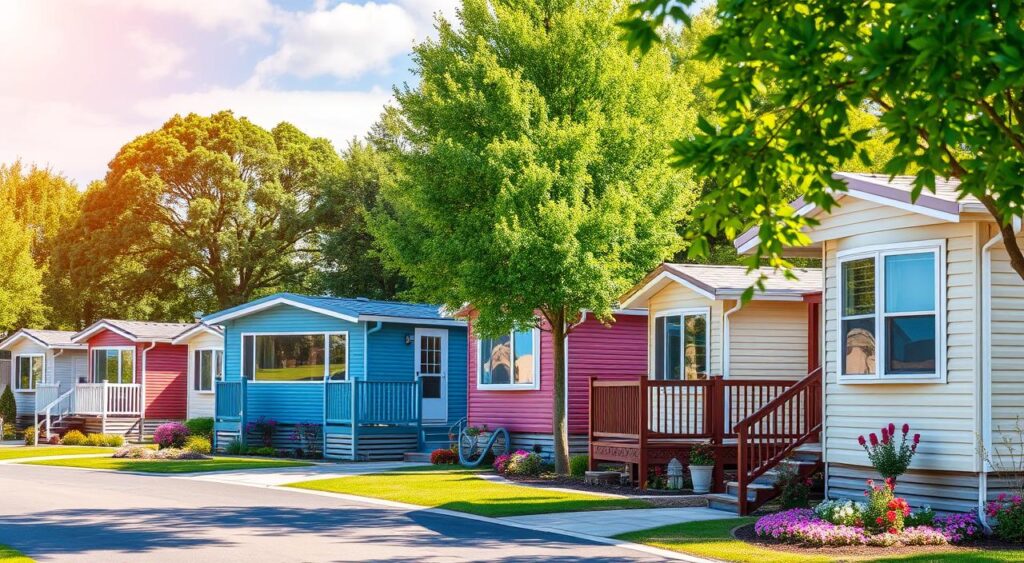
Mortgage Financing Options for Mobile Homes
Buying a mobile or manufactured home can be a smart choice for affordable housing. There are many mortgage options to help make this process easier. Buyers can choose from government-backed loans to conventional financing, depending on their needs.
FHA Loans for Mobile Homes
The Federal Housing Administration (FHA) has special loans for mobile and manufactured homes. These are called FHA Title I and Title II loans. Title I loans cover the home purchase, while Title II loans finance both the home and the land.
These loans have easier credit, debt, and down payment rules. This makes them great for those with tight budgets or credit issues.
Conventional Loans from Fannie Mae and Freddie Mac
Lenders also offer financing through Fannie Mae’s MH Advantage® program and Freddie Mac’s CHOICEHome Mortgage program. These loans let buyers finance manufactured homes for up to 30 years. Down payments can start as low as 3%, offering more flexibility and affordability.
With options like FHA loans for mobile homes, Fannie Mae and Freddie Mac manufactured home loans, and more, buyers have many ways to fund their mobile or manufactured home purchase.
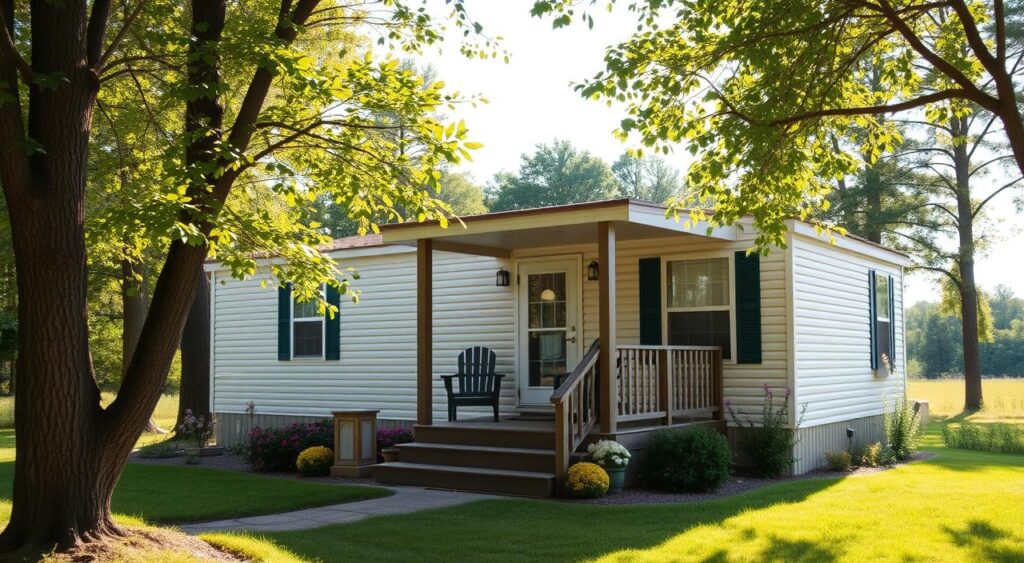
VA Loans for Manufactured Homes
If you’re in the military, you might qualify for a VA loan. These loans help you buy manufactured or modular homes and the land they sit on. They offer special benefits, making them great for veterans and active-duty service members.
VA loans for manufactured homes let you finance up to 100% of the cost, with no down payment needed. You can choose from loan terms of 15 years plus 32 days for owned homes, or 25 years plus 32 days for double-wide homes and land. This makes it easier for military folks to own a home.
To get a VA loan for a manufactured home, the home must be built after June 15, 1976. It also needs to meet VA construction and property standards. This means it must be fixed to a permanent foundation and follow HUD’s safety and construction rules.
While VA financing for mobile/manufactured homes is a big help, not all lenders offer these loans. It’s smart to shop around and compare to find the best loan for you.
Using military/veteran mobile home loans can make owning a home easier, even if it’s not a traditional house. It’s a great way for service members and veterans to achieve their dream of homeownership.
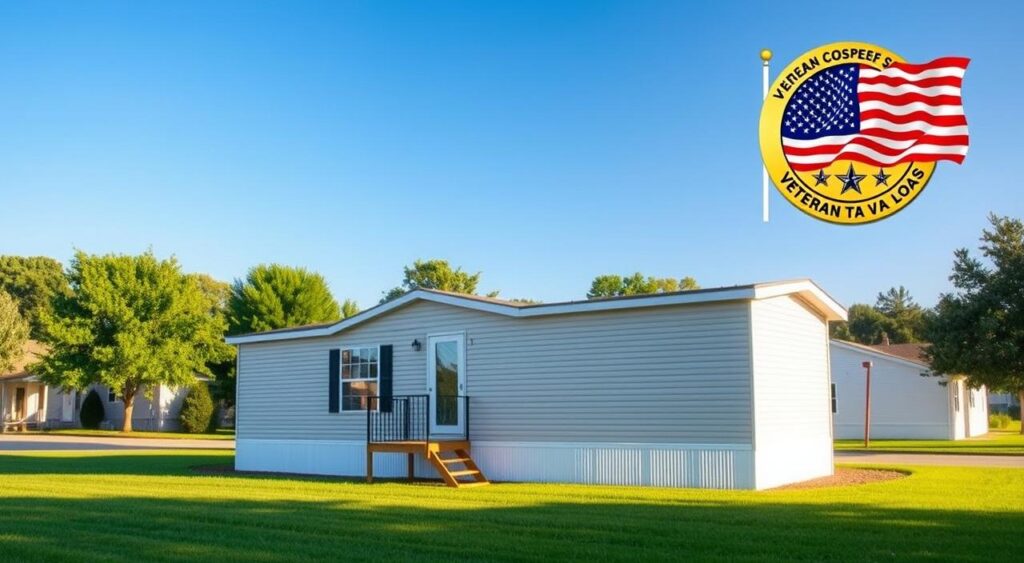
Chattel Loans for Mobile Home Financing
Chattel loans are a good choice for financing mobile or manufactured homes. They are personal property loans for expensive movable assets like mobile homes, planes, boats, and farm equipment. These loans use the property as collateral, unlike traditional mortgages.
Government agencies like the FHA, VA, or USDA’s Rural Housing Service insure chattel loans for mobile homes. They have higher interest rates and shorter terms than regular mortgages. But, the closing process is faster and less strict.
Key Chattel Loan Features
- Minimum FICO credit score requirement: 575*
- Minimum loan amount: $35,000
- Maximum loan amount: $275,000
- Minimum down payment: 5%, subject to additional requirements
- Loan term: 20-23 years
- No repossessions on auto loans in the last 24 months
- No collections over $1,000 opened in the last 12 months
- Stricter residual income test for lower credit and higher debt-to-income ratios
| Feature | Chattel Loans | Conventional Mortgages |
|---|---|---|
| Interest Rates | Higher | Lower |
| Loan Terms | Shorter (20-23 years) | Longer (30 years) |
| Closing Process | Faster | Slower |
| Collateral | Personal Property | Real Estate |
Chattel loans are a good choice for those looking at chattel loans for mobile homes, personal property loans for manufactured homes, or mobile home financing using chattel loans. Knowing the unique features and requirements of these loans helps borrowers make the best choice for their mobile home purchase.
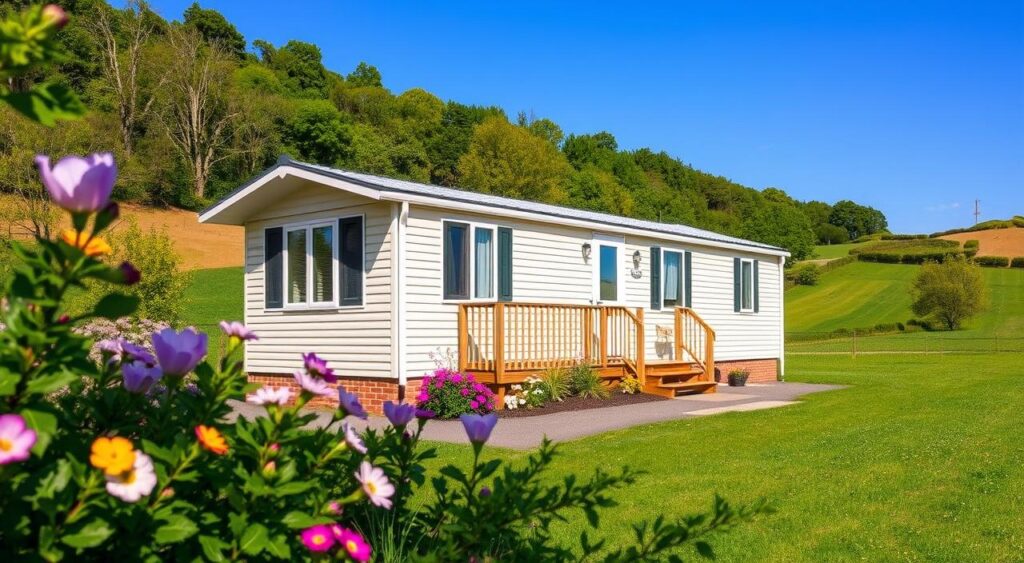
Personal Loans for Mobile Home Purchases
Looking to buy a mobile or manufactured home? Personal loans might be a good choice. They have higher interest rates than regular mortgages. But, they offer benefits that make them appealing for mobile home buyers.
One big plus of personal loans is the easy application process. Loan providers often decide quickly, sometimes in minutes. This speed is great for those who need to act fast on a mobile home purchase.
Personal loans also don’t require collateral. This means you won’t lose your home if you can’t pay back the loan. However, the interest rates are usually higher than other financing options. Still, not needing collateral makes personal loans more accessible for some buyers.
It’s important to know the loan limits when considering personal loans for a mobile home. Most providers offer loans up to $50,000. But, some might offer up to $100,000. This could be a problem for those wanting to buy more expensive homes.
Personal loans can be a good choice for financing a mobile or manufactured home. They’re great for those who value quick application processes and are okay with higher interest rates. But, it’s crucial to compare personal loans with other options to find the best one for your needs and budget.
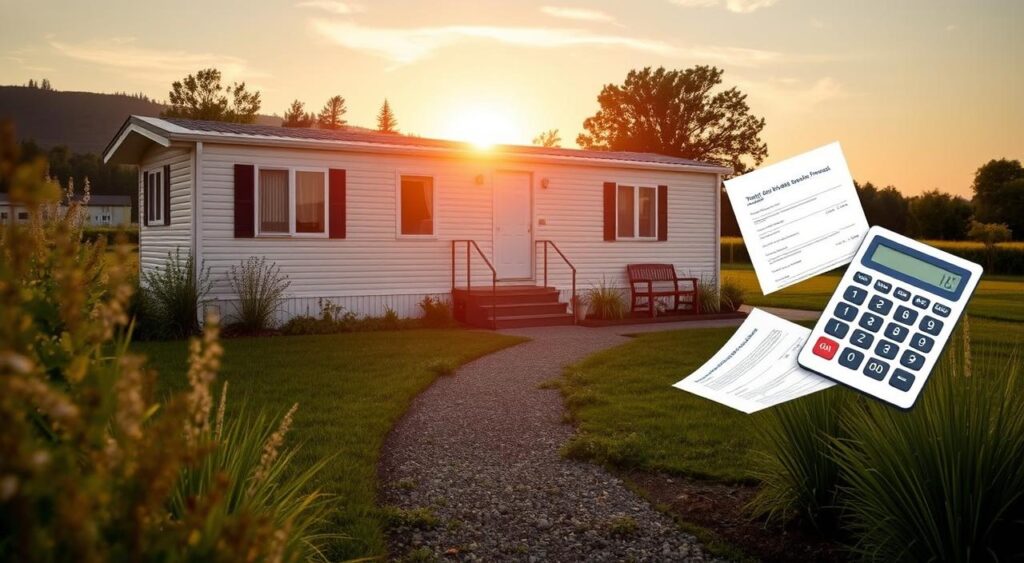
“Personal loans can be a flexible and accessible option for financing a mobile home, but it’s important to weigh the pros and cons carefully.”
Preparing for the Loan Application Process
When you’re preparing for a mobile home loan application, focus on two key areas. First, improve your credit score. Second, organize your financial documents well. These steps can lead to better loan rates and terms, making the process smoother.
Improving Your Credit Score
Your credit score is very important for loan approval. To improve your credit for manufactured home financing, start by checking your credit reports from TransUnion, Experian, and Equifax. If you find errors, fix them quickly to ensure your credit history is correct.
Also, pay down your debts, keep your credit utilization low, and make all payments on time. These actions can increase your credit score, making you more appealing to lenders.
Organizing Financial Documentation
Lenders need a lot of financial documents for your mobile home loan application. This includes recent pay stubs, tax returns, and bank statements. Make sure these documents are organized and easy to find. This shows you’re financially responsible and helps the lender understand your financial health.
By taking these steps to prepare for the mobile home loan application process, you can get better financing terms. This makes the whole experience easier.

Comparing Lenders and Loan Terms
When you’re looking to finance a mobile or manufactured home, it’s key to compare lenders and loan terms. Choosing the right lender can greatly affect the cost and affordability of your home. This choice can make a big difference in your overall budget.
Lenders usually need a credit score of 600 or more for mobile home loans. Some, like eLEND, require a score of 620. Loan amounts can start at $16,000 for purchases from dealers or retailers. For refinanced properties, the minimum is $25,000. Down payments can range from 5% to 35%, based on your credit score, the type of property, and other factors.
Loan terms vary among lenders, with options like fixed-rate or adjustable-rate mortgages. It’s important to look at the total cost of the loan. This includes interest rates, fees, and any penalties for early repayment. Knowing all the details in your loan agreement can prevent unexpected costs later on.
Specialized lenders for manufactured homes can be very helpful. They understand the unique needs of these homes. For example, Fannie Mae requires homes to be at least 400 square feet and 12 feet wide. They also need a minimum credit score of 620 for certain mortgages.
To find the best financing for your home, it’s crucial to compare offers from different lenders. Getting preapproval from at least three lenders can help you see the best interest rates and terms. This way, you can choose the most affordable and suitable option for your needs.
| Lender | Minimum Credit Score | Loan Amounts | Down Payment | Loan Terms |
|---|---|---|---|---|
| eLEND | 620 | $16,000 – $25,000 | 5% – 35% | Varies |
| Fannie Mae | 620 | $25,000+ | 5% – 35% | Fixed-rate, Adjustable-rate |
| FHA | 580 | $25,000+ | 3.5% | Varies |
| PenFed Credit Union | No minimum | Up to $50,000 | Varies | Personal Loan |
| ManufacturedHome.Loan | Varies | Varies | Varies | Chattel Loan |
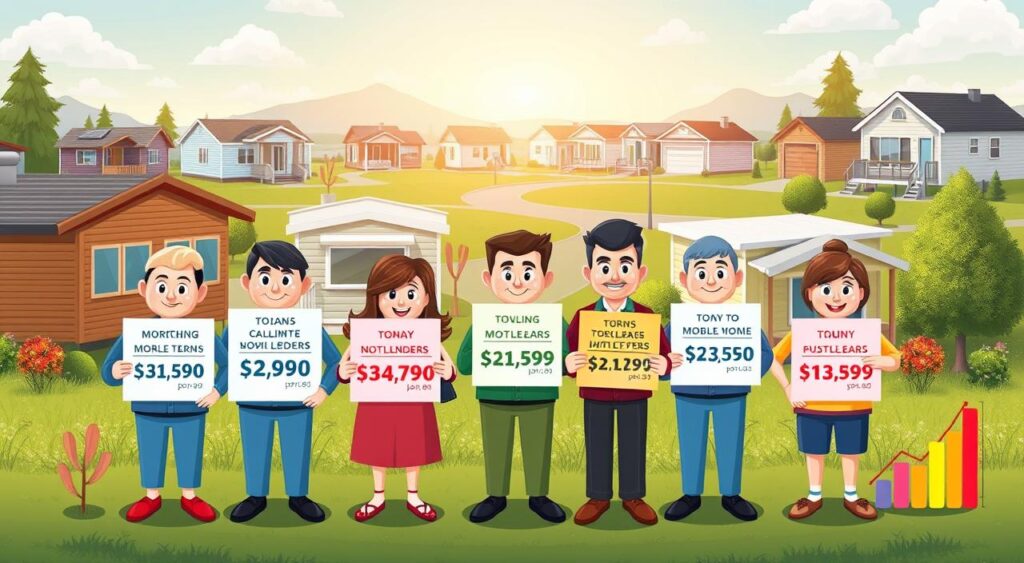
“Comparing offers from multiple lenders is essential to finding the best financing for your mobile or manufactured home. It’s crucial to understand all the terms and conditions to avoid unexpected costs.”
Government Programs for Affordable Financing
Getting a mobile home can be easier and cheaper with government help. The FHA and VA loans are well-known, but the USDA has special programs too. These USDA programs help low-income buyers in rural areas buy eligible manufactured homes.
To get these loans, you need to meet certain rules. These include where you live, how much you make, and the home’s energy use and design. These rules help you get better rates and lower down payments. This makes owning a mobile home more affordable.
- The USDA Rural Development program offers loans and grants for low-income buyers in rural areas, which can be used towards the purchase of eligible manufactured homes.
- HUD (the U.S. Department of Housing and Urban Development) also offers assistance through its programs, helping to make affordable mobile home loans more accessible.
- These government-backed initiatives aim to increase government-assisted mobile home financing options, allowing more families to realize the dream of mobile home ownership.
Finding the right programs for manufactured home financing can be hard. But, with the help of real estate pros and housing counselors, you can find the best options. They help you use these government programs to your advantage.
“These government programs are a game-changer for families looking to purchase a mobile home. The reduced costs and accessible financing make homeownership a reality for many who would otherwise struggle to afford it.”
With government help, buying a mobile home becomes possible. It removes financial hurdles and brings affordable, comfortable living closer to your dreams.
Increasing the Value of Your Mobile Home
Investing in your mobile home can make it more functional, beautiful, and valuable. This makes it more appealing to lenders and buyers. By making smart upgrades, you can improve its financing and resale value.
Ensuring your mobile home meets safety and compliance standards is key. Adding a permanent foundation can make it more stable and mortgage-ready. Upgrading utilities and making it more energy-efficient also adds value.
- Upgrade to a permanent foundation for increased stability and eligibility for conventional financing
- Improve utilities and energy efficiency to reduce operating costs and enhance the home’s appeal
- Incorporate smart home technology, such as smart plugs and thermostats, to modernize the property
- Replace the roof, siding, or flooring with high-quality, durable materials to enhance curb appeal and longevity
By focusing on home improvements for manufactured homes, you can increase your mobile home’s value. This makes it more attractive to lenders for financing. Keeping your home in good condition and following HUD Code standards also raises its resale value.
| Improvement | Estimated Value Increase |
|---|---|
| Permanent Foundation | 10-20% |
| Energy Efficiency Upgrades | 5-15% |
| Roof Replacement | 8-12% |
| Siding Replacement | 6-10% |
| Flooring Upgrades | 4-8% |
By maintaining and improving your mobile home, you can greatly increase its value. This improves your chances of getting good financing when you sell or refinance.
Getting Started with Mortgage Financing for Mobile Homes
Starting to finance a manufactured home might seem hard, but it’s doable with the right steps. First, check your finances, look into loan options, and improve your application. These steps help make the process easier.
First off, check your credit score and finances. A better credit score and less debt can help a lot. Also, learn about different loans like FHA, VA, and chattel loans to find the best one for you.
After knowing your finances and loan options, compare lenders and their terms. Choose lenders that focus on mobile homes for better rates and advice.
When you’re ready, contact a lender or use government help to get your mobile home. With the right steps and support, owning a mobile home can be exciting and fulfilling.
Key Steps to Getting Started with Mobile Home Financing:
- Assess your financial situation and credit score
- Research the different loan options available for manufactured homes
- Gather the required documentation to strengthen your loan application
- Compare lenders and loan terms to find the best fit for your needs
- Utilize government assistance programs or work with a specialized lender
| Financing Option | Loan Limits | Minimum Credit Score | Down Payment |
|---|---|---|---|
| FHA Loan | $92,700 – $970,800 | 500 – 580 | 3.5% |
| VA Loan | No set limit | 620 | 0% |
| Chattel Loan | $150,000 – $200,000 | 620 – 700 | 0% – 20% |
Remember, starting to finance a manufactured home is just the beginning. With the right preparation, the journey to owning a mobile home can be rewarding.
The Importance of Mobile Home Insurance
Getting the right insurance for your mobile home is key. Mobile home insurance is different from regular homeowners insurance. It covers risks like weather damage and construction issues.
It’s vital to find insurance that protects your home, belongings, and you. It should also cover moving costs if needed.
When you buy a manufactured home, think about the costs over time. This includes upkeep, utilities, taxes, and lot rent if you live in a community. Knowing these costs helps keep your finances stable and your home a good investment.
Types of Mobile Home Insurance Coverage
- Dwelling coverage for structural damage
- Other structures coverage for detached buildings
- Personal property coverage for belongings
- Liability insurance for injuries or property damage
- Additional living expenses coverage
- Trip collision coverage
Mobile home insurance policies have some exclusions. These include damage from flooding, earthquakes, and wear and tear. You might need extra coverage for these risks.
Mobile Home Insurance Costs
The cost of mobile home insurance varies. It can be between $750 and $1,600 a year. Costs depend on location, home age, and coverage options.
Looking at different providers can help you find the best deal. Companies like Allstate, American Family, Foremost, and State Farm offer various options.
Building a Strong Credit Profile
Getting good financing for a mobile or manufactured home depends on a strong credit profile. By working on your credit score and history, you can get better loan terms. This means lower interest rates and more affordable monthly payments.
Paying down existing debt is a key step in improving credit for mobile home financing. Lowering your debt-to-income ratio shows you can handle your finances well. Also, paying on time for all accounts, like credit cards and loans, helps build credit history for better mobile home loan terms.
Checking your credit report regularly and fixing errors is vital. Fixing mistakes or disputing questionable items can improve your credit score for manufactured home loans. This makes you look better to lenders.
It’s also important to avoid too many credit checks. Each check can lower your score a bit. By applying for less credit, you keep your profile clean and enhance your chances of securing favorable credit score tips for manufactured home loans.
In the end, a strong credit profile is key for mobile home financing. It also affects the financial side of buying a home. The better your credit, the more choices you have and the less you’ll pay over time.
“A healthier credit score not only aids in securing favorable financing but also impacts the overall financial aspects of purchasing a mobile home.”
Working with a Mobile Home Real Estate Agent
Finding a mobile home real estate agent can make buying a mobile home easier. These agents know a lot about mobile home real estate. They understand financing, community rules, and the benefits of working with a manufactured home specialist.
An experienced mobile home real estate agent can help you find the right home. They know what properties fit your needs and budget. They also help with negotiations to get you a good deal. Plus, they share local market insights, like prices and trends.
- Understand the mobile home real estate market and its unique characteristics
- Navigate the complexities of mobile home communities, land leases, and zoning laws
- Ensure that all legal requirements are met, including title transfer and proper registration
- Negotiate prices and secure the best possible terms for your mobile home purchase
- Provide insights into local market trends and any upcoming developments that may impact your purchase
Working with a mobile home real estate agent simplifies the buying process. They help you find the perfect home. With their help, you can buy a mobile home confidently and within your budget.
Understanding Market Trends and Regulations
It’s key to know about the mobile/manufactured home market. Things like mobile home market trends and local regulations for manufactured homes affect prices and where you can put them.
Recent numbers show the occupancy rates in the manufactured housing sector went up to 94.7% in the fourth quarter of 2023. Also, manufactured housing rents increased by 1.5% in the fourth quarter of 2023, with a yearly growth of 7.3%, averaging $679 per month across the U.S.
The sales volume for manufactured housing communities jumped by 25% in the second half of 2023 from the first half. But, the total transactions for the year were down by 40% compared to 2022 levels. This shows why it’s crucial to watch mobile home market trends closely.
It’s also important to know about local regulations for manufactured homes. You need to keep up with zoning laws, permits, and any size or placement restrictions. Following these rules helps protect your investment and makes the setup process smoother.
“By staying updated on these trends and regulations, you can better anticipate changes that might affect your investment and ensure compliance with all local guidelines, ultimately protecting and enhancing the value of your mobile home.”
Keeping an eye on the mobile/manufactured home industry is vital for making smart choices. Whether you’re buying for the first time or investing, knowing the latest mobile home market trends and local regulations helps you make the right decisions for your housing needs.
Conclusion
The world of mobile home financing has many options. You can choose from FHA loans, VA loans, and conventional mortgages. There are also chattel loans and personal loans. By understanding the mobile home market, you can find the right loan.
Key steps for a successful manufactured home loan include exploring your options and preparing your financial documents. Working with experienced real estate agents is also important. Staying up-to-date with market trends and regulations helps too.
When searching for your mobile home, remember the financing landscape is changing. Keeping up with new information can make your homebuying journey smoother. With the right approach and research, mobile home living can be a rewarding choice for affordable homeownership.
FAQ
What is the difference between a mobile home and a manufactured home?
A mobile home was built before June 15, 1976, on a permanent chassis. A manufactured home is similar but built after June 15, 1976. It follows new safety standards set by HUD.
What are some common financing options for mobile or manufactured homes?
Financing options include FHA Title I and Title II loans. There’s also Fannie Mae’s MH Advantage® program and Freddie Mac’s CHOICEHome Mortgage program. VA loans, chattel loans, and personal loans are available too.
How can I increase the value of my mobile home to improve my financing options?
To boost your mobile home’s value, consider upgrades. Add a permanent foundation, upgrade utilities, and improve energy efficiency. These changes can make your home safer, more functional, and attractive.
What should I consider when preparing for the mobile home loan application process?
When applying for a loan, focus on your credit score and financial documents. Understand the loan terms to avoid surprises. This preparation is key to a smooth application process.
How can working with a mobile home real estate agent benefit the financing process?
Working with a mobile home agent is very helpful. They know the market well, including valuation and financing. They can guide you through the process, making it easier.
What are some government programs that can assist with mobile home financing?
Government programs like FHA, VA, and USDA’s Rural Development can help. They offer better interest rates and lower down payments. These programs make owning a mobile home more affordable.

